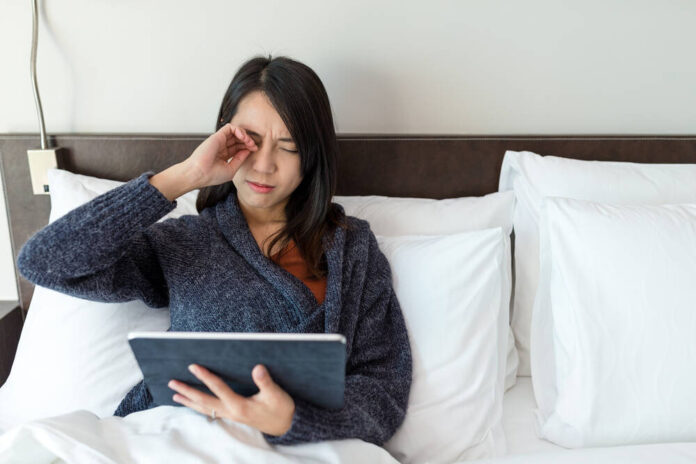
Right now you are reading this article from a device that emits blue light, whether it’s your phone, laptop, desktop, or tablet. Perhaps you’ll pop over to your TV later and catch a few shows or watch them on any of the aforementioned devices. You/we are living in a blue light world, and experts have expressed growing concern about the impact this exposure is having on our eyes and skin health. So what’s the story?
What is blue light?
Blue light is one of the colors of the visible spectrum (380 to 500 nanometers) of the electromagnetic spectrum that the human eye can see. It is contained in sunlight and electronic devices that many of us use for hours every day. According to Gary Heiting, OD, and member of the Eyesafe Vision Advisory Board, blue light has “nearly the same amount of energy as some ultraviolet (UV) rays, which are associated with skin cancer, cataracts, and other eye health problems.” Even though blue light has less energy than UV, it can penetrate deeper into the eye, which means it has the potential to damage cells in the retina and ultimately has long-term effects on vision. Blue light exposure is associated with eye discomfort and eye strain and also can cause or worsen dry eye.
It’s important to note that blue light provides benefits during daylight hours. That’s when it can enhance attention, mood, and reaction times.
Read about 5 ways to end sleep disruption from computer and tablet blue-lights
Blue light and circadian rhythm
One of the most important effects of blue light is on circadian rhythm and sleep. Exposure to blue light prior to retiring for the evening can disrupt the release of melatonin, a hormone that induces sleep. This can result in difficulty falling asleep as well as waking up in the middle of the night and getting up too early in the morning. Blue light comes not only from back-lit electronic screens but also from fluorescent and LED lights.
A 2014 Harvard study compared the impact of six and a half hours of exposure to blue light and green light. The blue light suppressed melatonin for about twice as long as the green light and also shifted circadian rhythm twofold (3 hours vs 1.5 hours).
You can block your exposure to blue light by wearing blue light-blocking glasses or placing screen filters on your laptop and other devices. Recent research has shown that glasses can reduce the time it takes to fall asleep among people with sleep disorders, variable shift work schedules, and jet lag.
Read about why you need blue light-blocking glasses
Blue light and skin health
Consider the amount of time you spend every day looking at a computer, tablet, or smartphone screen. You are facing blue light emissions, so what are they doing to your skin? According to Joshua Zeichner, MD, director of cosmetic and clinical research in the dermatology department at Mount Sinai Hospital’s Department of Dermatology in New York City, “as we spend more and more time looking at our devices, we do need to consider the effects of long-term, low-level exposure.”
Research on the effects of blue light on skin health is still in its infancy. Thus far, evidence indicates that when blue light penetrates the skin, it can “cause reactive oxygen species, which then can lead to DNA damage and breakdown of our collagen and elastin fibers,” notes Jason Bloom, MD, a facial plastic and reconstructive surgeon in Bryn Mawr, Pennsylvania. A small study also reported that exposure to blue light is connected to the production of cell-damaging free radicals in the skin. This can lead to accelerated aging of the skin.
How to protect skin against blue light damage
One way to protect your skin against the potential damage associated with blue light exposure is to apply iron oxides. These are pigments approved by the Food and Drug Administration for use in beauty products, foods, drugs, and other consumer products. Iron oxides can protect the skin against blue light, according to board-certified dermatologist Geeta Dr. Yadav, MD. The Environmental Working Group rates iron oxides as safe, with low concerns for cancer, immunotoxicity, allergies, and developmental and reproductive toxicity.
Some other tips on how to protect your skin against blue light damage:
- Apply a broad-spectrum sunscreen, even when indoors and using electronic devices.
- Use skincare products that contain antioxidants, such as vitamin C, and zinc oxide.
- Use a blue light screen protector on your electronic devices.
- Use night mode on your electronic devices. This disables blue light and turns on yellow light instead.
- Keep your devices at arm’s length, especially your phone. Use the speaker and place your phone away from your body.
Bottom line
Blue light is everywhere around us, and extensive use of electronic devices has greatly increased that exposure. Take steps to reduce your exposure to help protect your vision, skin, and sleep health.










